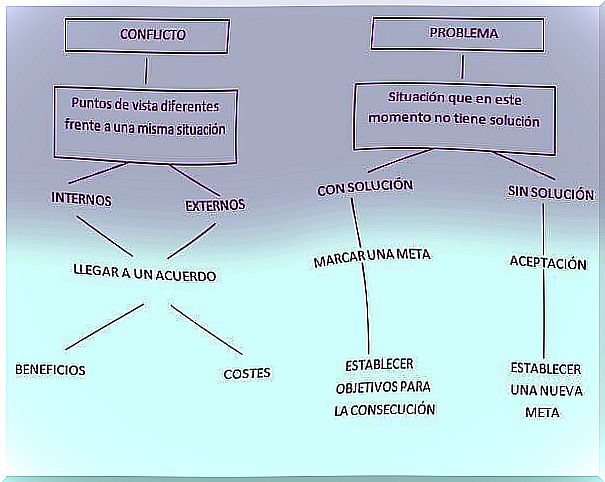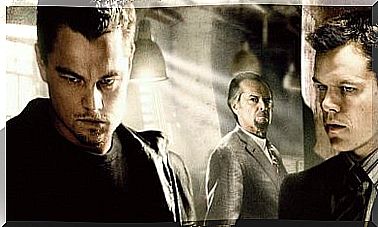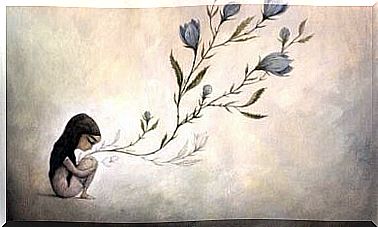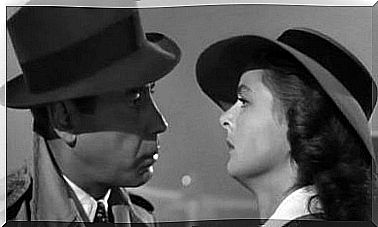Do You Know How To Differentiate A Problem From A Conflict?

Most of the times when we are faced with interpersonal problems, the lack of successful resolution is just a matter of “definition. ” When we face a difficult situation, our negative emotions skyrocket and sometimes cloud everything that is important, leading us to total paralysis in the face of the difficulty. Suddenly we feel trapped, drowned, we do not find solutions but … what are we facing? Facing a conflict may not be an easy task, but we can emerge stronger from it.
Undoubtedly, throughout life, we will encounter situations that pose a challenge to us. In those moments, our ability to resolve conflicts will help us to overcome the setback or prompt us to seek help.
Do you know what a conflict is?
These are two (minimum) different points of view in the same situation. It is not more than that. Therefore … How many conflicts do we go through in a day? Conflicts surround us, they live with us, they are part of the human being and they are also a powerful source of learning… if they are well focused. As Freud would say: “If two individuals always agree on everything, I can assure that one of the two thinks for both of them . “

Therefore, we have to accept them and know how to manage them. But what is the solution to a conflict? Sometimes the obvious is the most important thing: the resolution of a conflict is as simple and as complex as “reaching an agreement”.
Sometimes we get involved in eternal discussions that do not lead to any conclusion, just to be “right”, when in most cases “reason” is totally secondary. Almost every conflict we face can be resolved by agreement. Most of the time it is a discussion of your own convictions that has nothing to do with what happens. Therefore, giving in a bit in our position to reach a common agreement may be a possible solution.
The agreements imply that both parties must emphasize: both must renounce some concepts, some priority, to achieve the common good … Every resolution carries consequences, but those consequences do not invalidate the agreement, that is to say: I face , I trade, and I lose one part while I gain another. The part I lose is only a consequence, therefore it does not have the power to shake the deal.
Internal conflicts
But what if the conflict is internal? It seems more complex, but in essence it is the same structure: I have two different points of view in the same situation, so what am I trying to do? The answer is the same: yes, come to an agreement. Diving inside and finding out which solution is the best for us will help us find the answer we are looking for. Although sometimes, the best long-term solution is the one that entails the greatest sacrifice in the short term.
To do this, I have to assess alternatives and make a decision, even if it has consequences that involve losses. Losses are acceptable, since the gains will be valued as a whole and the balance would be positive. Therefore, what good is self-punishment or self-criticism? No problem.
It is a matter of accepting and validating the consequences. As in the conflicts that we resolve externally, we find gains and consequences that we must accept. In internal conflicts the same thing happens: the consequence is inherent to the resolution, therefore we must accept it and not punish ourselves with it contaminated by emotion.
The resolution is carried out free of emotion, cold and evaluating the alternatives. Therefore, the criticism that the acceptance of consequences produces is not only unnecessary but also avoidable. It is known that sometimes you have to decide with your heart, however, this is not always the case. While emotion can lead us to perpetuate a toxic relationship, the mind tells us that it is time to leave that relationship. So on many occasions, we must put aside the emotion to think coldly what is best for us.
But … then what is a problem?
We understand a problem as a situation that arises and “at this moment” has no solution. Then what do we do? important: find the solution set a goal
Once the goal is established, we put into practice the possible alternatives to reach the solution of our problem, we value them, we weigh them and then we get going. As in conflicts, emotion acts as a paralyzing enemy.

Sometimes the resolution will be simple and sometimes not, but our goal is still valid. The road can be difficult, but we will be constant if we know where we want to go. The important thing is to draw a clear path and follow it, correcting the course as many times as necessary if necessary.









